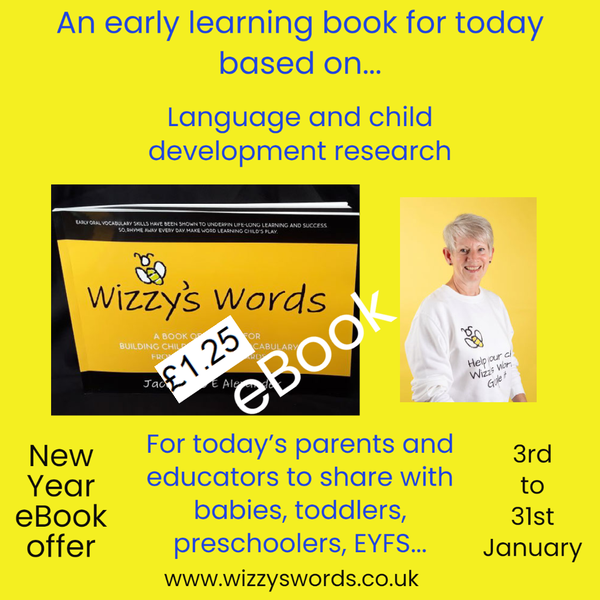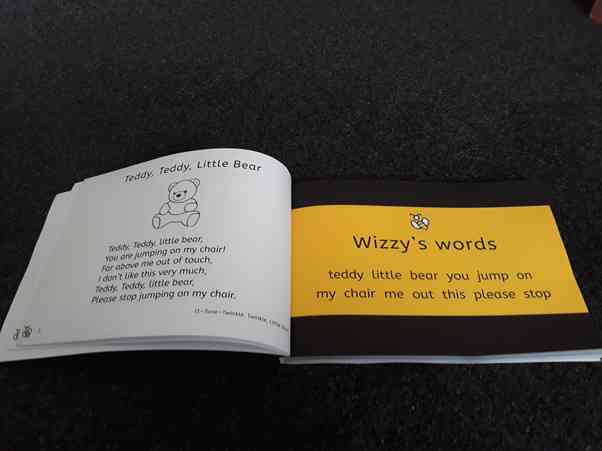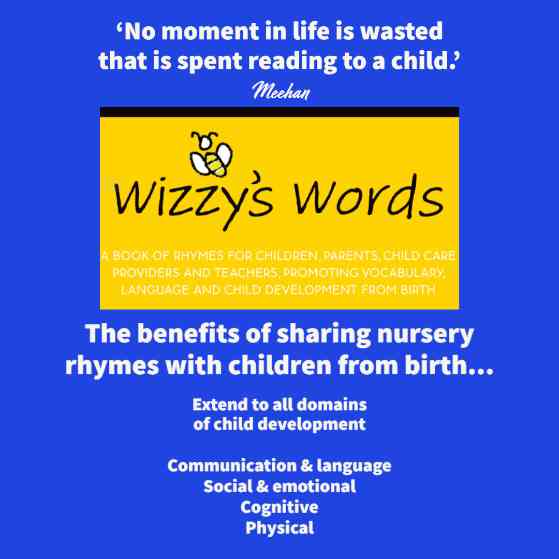WIZZY‘S WORDS #newyear #eBook #pricedrop

WIZZY‘S WORDS | Book of rhymes
NEW YEAR OVERVIEW & EARLY LEARNING OFFER
The eBook offer is a great way to explore the benefits of rhyme from birth to 100! Follow the podcast link to hear more about why rhyme contributes to early and lifelong learning.
www.buzzsprout.com/1267127/11717549-the-power-of-rhyme-with-jacqueline-alexander
USE THE 5 MINUTE READ BELOW FOR THE STORY OF WIZZY'S WORDS
![]()
![]()
![]()
![]()
![]()
FROM TEACHER TO RESEARCHER | RESEARCH OVERVIEW 1
The importance of developing oral vocabulary in the early years
As a teacher I observed a number of children entering school with a language learning gap. This then often impeded their educational progress. Returning to my child development and research background, I conducted extensive research and completed my first literature review to examine whether language development from birth was being overlooked. The review highlighted an ongoing language learning gap, specifically in terms of school entry, oral vocabulary. This gap continues to have a deleterious impact on the education and life outcomes for a number of children. My initial research was completed in 2020 and led to the development and publication of Wizzy’s Words. Wizzy’s Words is a book of 70 rhymes, with carefully selected images to promote learning. The book is available in paperback, eBook and audiobook formats. The book is being used in home settings and schools to promote early learning. An illustration of the page layout for the book is shown below. A rhyme is presented on the left-hand page and the focus oral vocabulary is presented on the right-hand page. The full set of words is provided at the back of the book. This is for reference rather than assessment purposes. The aim is to share the rhymes, many of which follow traditional tunes, in a fun and active way. The best way to promote early learning.

The words used in developing the book are taken from validated language development research. This is important. Often reading vocabulary rather than oral vocabulary is presented in young children’s books. The early sharing of sounds and words that are frequently spoken, i.e., oral vocabulary, is associated with the phonological awareness that underlies the development of reading and learning readiness. Written word frequencies will of course play a role in learning to read and there will be overlap of spoken and written word frequencies. However, for the best start, a focus on sharing sounds and oral vocabulary will ensure more inclusive early learning for more children. The audiobook is narrated rather than sung in order to ensure that initially the oral vocabulary is clearly presented. However, this should not be seen to limit actions and interactions. Sounds have been added to the audiobook to promote the modelling and sharing of sounds. As indicated hearing and repeating sounds forms the basis of the phonological awareness that underpins language learning.
Following publication of Wizzy’s Words I was approached by a number of people interested in exploring how the rhymes could be used further to promote active learning. For example, see the guest blog post and review by learning differences specialist, Mary Mountstephen. This interest led me to conduct further research. The focus being on exploring the question ‘Do nursery rhymes represent a key to early language learning and development?’ Rather than being focused on the importance of oral vocabulary development, the review examined more closely the if, how and why nursery rhyme/rhyme exposure contributes to early language and child development.
![]()
![]()
![]()
![]()
![]()
FROM TEACHER TO RESEARCHER | RESEARCH OVERVIEW 2
The importance of nursery rhymes for early language learning and child development
The findings from the second review showed that sharing rhyme and rhyming stories, actively and interactively, with children from birth onwards is an indicator for successful early and lifelong learning. Consequently, rhyme can be seen to provide the basis for developing the sounds and spoken words that promote the phonological awareness that precedes phonics and learning to read. However, the second review highlighted that the nature and rhythm of rhyme is key to successful language development and child development outcomes. Rhythm perception at school entry has been shown to relate to educational success. Rhyme and its rhythm promote further development of a child’s innate neural circuitry. Synchronisation is increasingly being seen to relate to improving learning outcomes, especially when neural differences have been identified. Significantly, the follow up review findings indicate that early exposure to nursery rhymes goes beyond promoting oral vocabulary development as the first review reported. The benefits of nursery rhymes extend to all domains of child development, communication and language, cognitive, physical and social and emotional. Furthermore, sharing nursery rhymes from birth (and even before) will promote the best early and lifelong learning outcomes for all children.
![]()
![]()
![]()
![]()
![]()
NEXT STEPS…
The follow up review provides the basis to develop a companion book to Wizzy’s Words that twins rhyme and graded actions for baby, toddler and pre-schooler developmental milestones. However, in the current economic climate, in the spring of 2023, I hope to develop a set of resources that can be downloaded free, from this website. The resources will be suitable for children with typical and less typical development.
![]()
![]()
![]()
![]()
![]()
Wizzy’s Words…

A social initiative | 70 rhymes for today, promoting | bonding | vocabulary | social & emotional | knowledge & understanding | communication & language | physical & cognitive development

‘A book to couple the mind and body for learning and acknowledging the important role that rhyme plays in all domains of learning, for all children.’ Alexander 2022
![]()
![]()
![]()
![]()
![]()
If you have any questions or would like to request copies of the research, please use the website contact button or email me - wizzyswords@gmail.com
Literature Review 1
PLUGGING THE EARLY LANGUAGE SKILLS GAP
A literature review addressing the question:
Is the importance of language development from birth being overlooked?
Jacqueline E. Alexander (2020)
Literature Review 2
PLUGGING THE EARLY LANGUAGE SKILLS GAP
Revisiting the importance of language development from birth
A literature review addressing the question:
Do nursery rhymes represent a key to early language learning and development?
Jacqueline E. Alexander (2022)
![]()
![]()
![]()
![]()
![]()
SIMPLIFYING KEY TERMS
Phonological awareness – an awareness of the sounds of language and being able to hear and recognize different sounds
Phonics – being able to match the sounds of spoken English to individual letters or groups of letters
![]()
![]()
![]()
![]()
![]()
FOR PREFERRED RETAILER AND FORMAT OPTIONS (paperback/eBook/audiobook)
http://www.troubador.co.uk/bookshop/young-children/wizzys-words
Follow wizzyswords @ Facebook Instagram Twitter